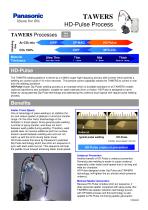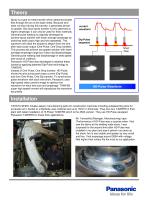 ウェブサイト:
Panasonic Robot & Welding system solutions
ウェブサイト:
Panasonic Robot & Welding system solutions
グループ: Panasonic Factory Solutions Europe
カタログの抜粋

TAWERS HD-Pulse Process Shielding Gas Mild Steel Material Thickness Ultra Thin HD-Pulse The TAWERS welding platform is driven by a 100kHz super high frequency primary side inverter which permits a welding arc control cycle of 10 micro-seconds. This precise control capability allows the TAWERS to control in real time the welding waveform. HD-Pulse (Hyper Dip Pulse) welding process is an example which is available standard on all TAWERS models (optional waveforms also available). suitable for steel materials 3mm or thicker. HD-Pulse is designed to travel faster by using patented Dip Pulse technology and addressing the undercut issue typical with regular pulse welding process. Benefits Faster Travel Speed One of advantage of pulse welding is to stabilize the arc and reduce spatter at globular or short/arc transfer range. On the other hand, disadvantage is the limitation in travel speed. Since general pulse welding is similar of spray transfer, wire does not short between weld puddle during welding. Therefore, weld puddle does not receive additional pull from surface tension caused between welding wire and can not catch up with the torch during faster travel. HD-Pulse solves this issue by Panasonic’s patented Dip Pulse technology which has short-arc sequence in sync with each pulse out put. This sequence will help the puddle move forward achieving faster travel speed. Undercut typical pulse welding HD-Pulse at 300A, travel speed 1.3m/min HD-Pulse undercut prevention Undercut Prevention Another benefit of HD-Pulse is undercut prevention. General pulse welding is easier to cause undercut especially under faster travel speed due to its long and wide arc character. HD-Pulse designed under Dip Pulse and TAWERS technology, will tighten the arc shorter which prevents undercut. Minimal Spatter Generation Because HD-Pulse includes short-arc sequence, it does generate spatter compared with spray pulse. But TAWERS has spatter reduction technology proven with SP-MAG process and this technology is also applied to HD-Pulse minimizing spatter generation. P0004ED
カタログの1ページ目を開く
Theory Spray is a type of metal transfer which detached droplet flies through the arc to the base metal. Because wire does not short during this transfer, it generates almost no spatter. But since spray transfer is only observed at higher amperage, it can only be used for thick materials. General pulse welding is originally developed to achieve spray transfer with lower average amperage by switching weld output high and low repeatedly. This waveform will allow the droplet to detach from the wire after each pulse output (One-Pulse, One-Drop transfer). This process did achieve low spatter...
カタログの2ページ目を開くPanasonic Robot & Welding system solutionsのすべてのカタログと技術パンフレット
-
PC-Software DTPS
10 ページ
-
Wire Booster
2 ページ
カタログアーカイブ
-
PAN1326C2
1 ページ
-
Power Choke Coil
19 ページ
-
POSCAP
40 ページ
-
E-Bike Systems
12 ページ
-
PAN1760A
2 ページ
-
PAN1740
41 ページ
-
PAN1761
2 ページ
-
EUROPEAN E-CALL
2 ページ
-
EMERGENCY LIGHTING
2 ページ
-
PAN1326C2 2019
48 ページ
-
PAN1762
17 ページ
-
PAN1326C
40 ページ
-
PAN9026
82 ページ
-
PAN1326 Design Guide
22 ページ
-
Panasonic Torches
2 ページ
-
Microcomputer
24 ページ
-
Handling Robots
2 ページ
-
TAIWERS-Welding Solution
12 ページ
-
Panasonic Positioner
4 ページ
-
DTPS G3-Software
4 ページ
-
G3 Robot Controller
1 ページ
-
YD-350GB2
2 ページ
-
DTPS-G3
4 ページ
-
WG3 Welding Robots
12 ページ
-
SP-MAG Process
2 ページ
-
TIG Filler System
1 ページ
-
PerformArc C Series
1 ページ
-
PerformArc TT Series
1 ページ
-
PerformArc MT Series
1 ページ
-
PerformArc ET Series
1 ページ
-
TAWERS WG3 Series
12 ページ
-
Positioners
4 ページ
-
Panasonic Eco ideas
2 ページ




















































































